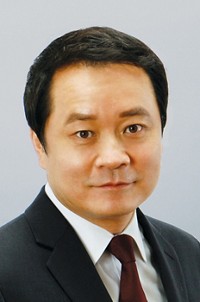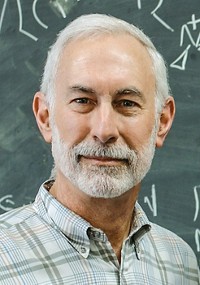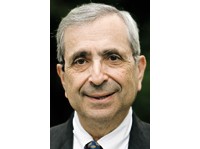Advertisement
Grab your lab coat. Let's get started
Welcome!
Welcome!
Create an account below to get 6 C&EN articles per month, receive newsletters and more - all free.
It seems this is your first time logging in online. Please enter the following information to continue.
As an ACS member you automatically get access to this site. All we need is few more details to create your reading experience.
Not you? Sign in with a different account.
Not you? Sign in with a different account.
ERROR 1
ERROR 1
ERROR 2
ERROR 2
ERROR 2
ERROR 2
ERROR 2
Password and Confirm password must match.
If you have an ACS member number, please enter it here so we can link this account to your membership. (optional)
ERROR 2
ACS values your privacy. By submitting your information, you are gaining access to C&EN and subscribing to our weekly newsletter. We use the information you provide to make your reading experience better, and we will never sell your data to third party members.
People
Joel Henry Hildebrand Award in The Theoretical & Experimental Chemistry of Liquids
Recipients are honored for contributions of major significance to chemistry
by Robin M. Giroux
February 23, 2009
| A version of this story appeared in
Volume 87, Issue 8
Sponsored by ExxonMobil Research & Engineering Co.
When he was in high school, Graham R. Fleming thought physical chemistry was the most interesting part of chemistry. By working to satisfy that early interest, he’s established himself as one of the outstanding chemists and spectroscopists in the field of ultrafast dynamics in liquids and solvation. Winning this award, he says, feels special because “I work in Hildebrand Hall at the University of California, Berkeley, and walk past a display case of Hildebrand’s work and achievements several times a day.”
Fleming, 59, says he was drawn to “the elegant and incisive molecular beam studies of chemical reactions of Dudley Herschbach, Yuan Lee, Dick Bernstein, John Polanyi, and others.” These studies were conducted in the gas phase, but chemists generally run their reactions in solution. “The choice of solvent,” Fleming explains, “has a big influence on products, reaction rates, et cetera. I wanted to see if similarly incisive experiments could be done on liquids and solutions.”
He’s proven that, indeed, condensed-phase dynamics of chemical and biochemical systems can be studied, the results systematically analyzed, and incisive information gathered. Fleming’s work is “a remarkable combination of the development of novel experimental techniques with brilliant applications to molecular systems,” says Shaul Mukamel, a chemistry professor at UC Irvine. “His work has triggered an enormous amount of activity on molecular dynamics, vibrational coherence, energy, and charge transfer.”
Fleming has been in the vanguard of the development of sophisticated time-resolved spectroscopic techniques. Recent work on two-dimensional fifth-order Raman spectroscopy has provided “the first experimental insight into the anharmonic potential surface of a room-temperature liquid,” UC Berkeley chemistry professor Gabor A. Somorjai notes.
To date, Fleming has made important contributions in three major areas: study of condensed-phase chemical reaction dynamics, particularly in liquids, and development of computer simulation methods for interpreting the experimental results; studies of the primary steps in photosynthesis; and development of optical coherence/photon echo spectroscopies to look at chromophore-bath interactions in chemical and biological systems. “A major strength of his research has been the synergy among all of these areas and between theory and experiment,” says Norbert F. Scherer, a professor of chemistry at the University of Chicago.
Currently, Fleming’s group is trying to understand the role of quantum coherence in photosynthetic light harvesting and the role of the protein that helps the chlorophylls in protecting this coherence. “This takes my interest in solute-solvent interactions into a new area. We are trying to unravel the way in which plants regulate photosynthetic light harvesting,” he says. “We are also studying the spectroscopy and dynamics of single-walled carbon nanotubes, which also exhibit long-lived quantum coherence at room temperature.”
Fleming earned a B.Sc. degree in chemistry from the University of Bristol, in England, in 1971 and a Ph.D. in physical chemistry from the Royal Institution/University of London three years later. After research fellowships in the U.S. and Australia, Fleming joined the faculty of the University of Chicago as an assistant professor and moved up the ranks; he was the Arthur Holly Compton Distinguished Service Professor at Chicago in 1997, when he headed west. He had accepted a dual appointment as a professor at UC Berkeley and as the first director of the Physical Bioscience Division of Lawrence Berkeley National Laboratory.
Today, Fleming holds two leadership positions at UC Berkeley. He is the Melvin Calvin Distinguished Professor of Chemistry and Berkeley director of the California Institute for Quantitative Biosciences.
He’s the recipient of three other ACS national awards; just last year he received the Ahmed Zewail Award in Ultrafast Science & Technology. The Royal Society of Chemistry, of which he is a fellow, has honored Fleming with several awards, as have other organizations. He is also a member of the National Academy of Sciences.
Fleming will present the award address before the Division of Physical Chemistry.






Join the conversation
Contact the reporter
Submit a Letter to the Editor for publication
Engage with us on Twitter